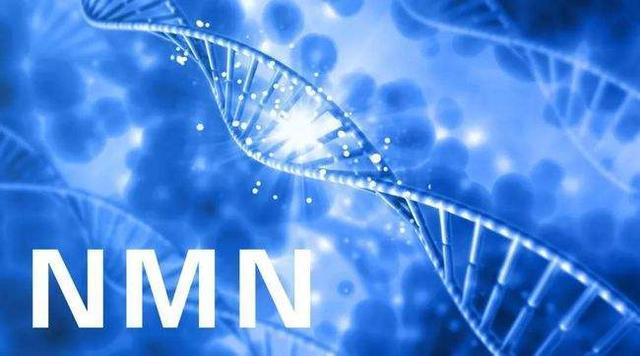A world first! NMN research results shock release: Effective inhibition of atherosclerosis
Recently, a research team from China Agricultural University made a breakthrough in the field of cardiovascular disease research, and this innovative research results show that:
- NMN reduced the size of atherosclerotic plaques (36%) and necrotic cores (48%) in the aortic sinus.
- NMN reduced the lipid area of atherosclerotic lesions (43%) and increased collagen content (51%).
- NMN decreased the serum malondialdehyde (MDA) level and increased the enzyme activities of superoxide dismutase (SOD) and glutathione peroxidase (GSH-PX).
- NMN decreased the expression of pro-inflammatory factors (TNF-α, Il-1β, Il-6, and Mcp-1) and increased the expression of anti-inflammatory factors (Arg-1, Mrc-1, Retlna, and Irf-4) in aortic tissue.
The study is the first in the world to test NMN in an animal model of atherosclerosis.
In experiments, the researchers recreated the process of plaque formation and accumulation in the middle arteries in humans by feeding mice a diet high in cholesterol and fat.
After 8 consecutive weeks (6 days a week), mice were injected with NMN daily (a dose of 500mg/kg).
The results showed that the mice in the saline and Nicotinamide Mononucleotide groups had no significant difference in body weight and food consumption, and there was no change in blood lipids.
This showed that NMN did not affect the weight or appetite of mice, which laid a foundation for further exploration of the specific mechanism and effect of Nicotinamide Mononucleotide on atherosclerosis in subsequent experiments.
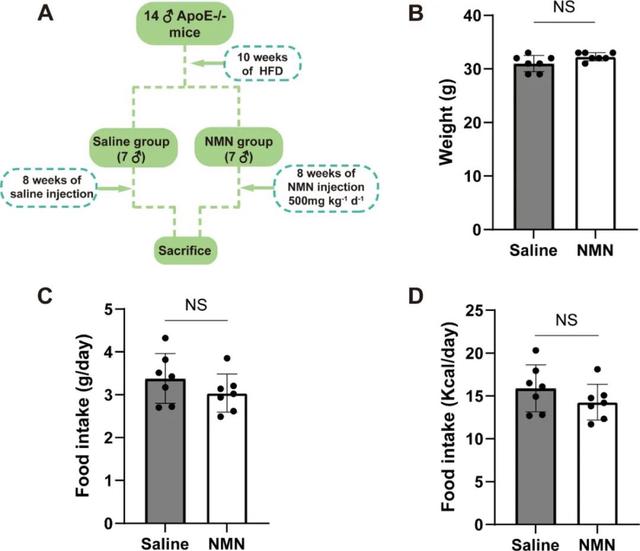
NMN two effects:
NMN can inhibit atherosclerosis
In analyzing the size and lipid distribution of atherosclerotic plaques, the researchers found that mice injected with Nicotinamide Mononucleotide had a 36 percent reduction in atherosclerotic plaque area compared to a control group injected with saline alone, suggesting that NMN helps reduce plaque formation.
In addition, Nicotinamide Mononucleotide also reduced lipid deposition in atherosclerotic lesions, reducing it by 43 percent.
Further histological analysis also found that the proportion of advanced lesions was reduced by 25% in the NMN-treated mice compared to the saline group, while the proportion of early lesions increased by 42%. This means that Nicotinamide Mononucleotide may help prevent further progression of atherosclerosis.
Combining the above results, it can be concluded that NMN may help reduce atherosclerotic plaque load and lipid deposition in mice.
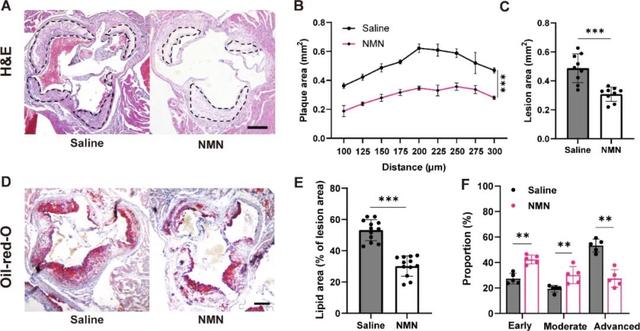
NMN prevents arterial plaque from rupturing
In studying the stability of Nicotinamide Mononucleotide on atherosclerotic plaques, the researchers found that mice injected with NMN had significantly smaller, 48 percent fewer dead cores than a control group injected with saline alone.
In addition, NMN treatment increased collagen content in atherosclerotic plaques by 51%, further supporting the conclusion that Nicotinamide Mononucleotide contributes to plaque stability.
These results suggest that Nicotinamide Mononucleotide helps to improve the stability of atherosclerotic plaques in mice and prevent arterial plaque rupture.
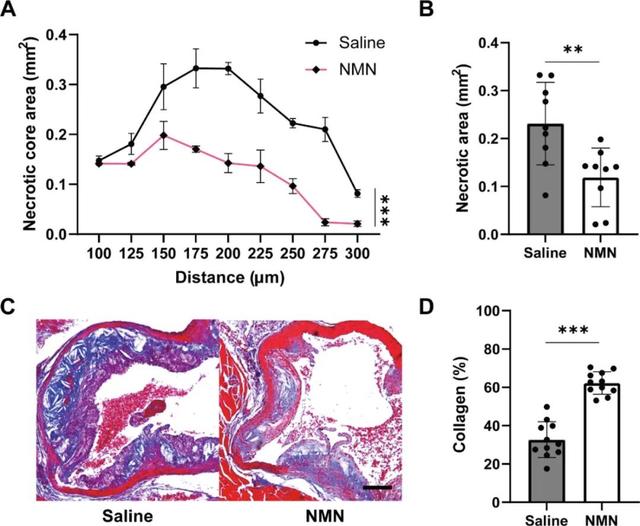
Two ways of protection:
NMN antioxidant prevents atherosclerosis
In investigating whether NMN could reduce oxidative stress in mice, the researchers found that treatment with Nicotinamide Mononucleotide significantly reduced levels of MDA (a marker of lipid peroxidation and oxidative stress) in the mice’s serum, meaning that lipid peroxidation was reduced.
At the same time, levels of SOD and GSH-PX (two enzymes that help the body fight oxidative stress) also increased, indicating that the mice’s antioxidant capacity improved.
These results suggest that Nicotinamide Mononucleotide may inhibit the progression of atherosclerosis through its antioxidant capacity.
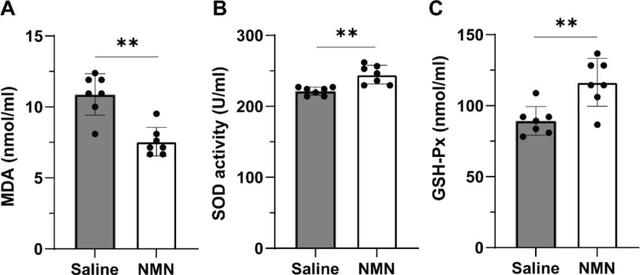
NMN regulates macrophages against plaque inflammation
In investigating whether NMN inhibits plaque inflammation by regulating the polarization of macrophages, the researchers found that Nicotinamide Mononucleotide inhibits gene expression in M1 macrophages (which produce pro-inflammatory cytokines), while Nicotinamide Mononucleotide enhances gene expression in M2 macrophages (which produce anti-inflammatory cytokines).
This implies that NMN is able to promote the transformation of macrophages to a more anti-inflammatory M2 phenotype, thereby inhibiting the inflammatory response of plaques.
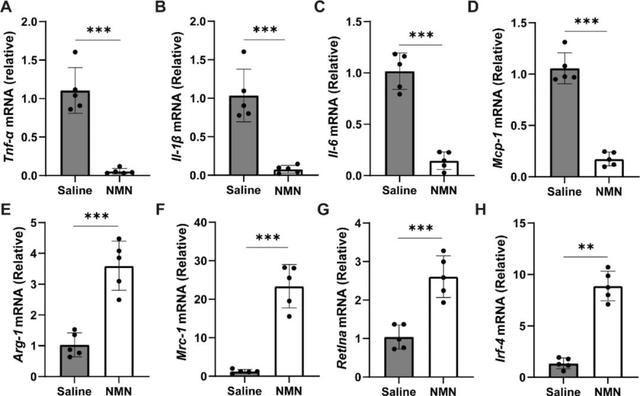
In summary, the study of China Agricultural University revealed that Nicotinamide Mononucleotide not only effectively inhibits atherosclerosis, but also helps to improve the stability of atherosclerotic plaques in mice and prevent artery plaque rupture.
Moreover, inhibition of atherosclerosis by antioxidant mechanism and inhibition of plaque inflammation by regulating macrophage polarization provide a new strategy for the prevention and treatment of atherosclerosis.
About atherosclerosis
Atherosclerosis a common vascular disease characterized by the accumulation of fat and calcium in the inner lining of the arteries, which causes the walls of the blood vessels to thicken, harden, and lose their elasticity, leading to narrowing of the vascular cavity.
This disease mainly affects the large and medium arteries, such as coronary arteries, carotid arteries, cerebral arteries, renal arteries, etc., can lead to a variety of cardiovascular diseases, such as coronary heart disease, cerebral infarction, peripheral vascular disease and so on.
The pathogenesis of atherosclerosis not fully understood, but studies have found that the disease associated with a variety of factors, such as dyslipidemia, high blood pressure, diabetes, smoking, obesity, and so on.
These factors may lead to endothelial cell damage, inflammation, oxidative stress and other pathological processes, and then lead to the occurrence and development of atherosclerosis.
References:
- Zi Wang, Shuaishuai Zhou, Yanling Hao, Tiancheng Xu, Peng An, Yongting Luo, Junjie Luo,Nicotinamide mononucleotide protects against high-fat-diet-induced atherosclerosis in mice and dampens aortic inflammation and oxidative stress,Journal of Functional Foods,Volume 112,2024,105985,ISSN 1756-4646,

